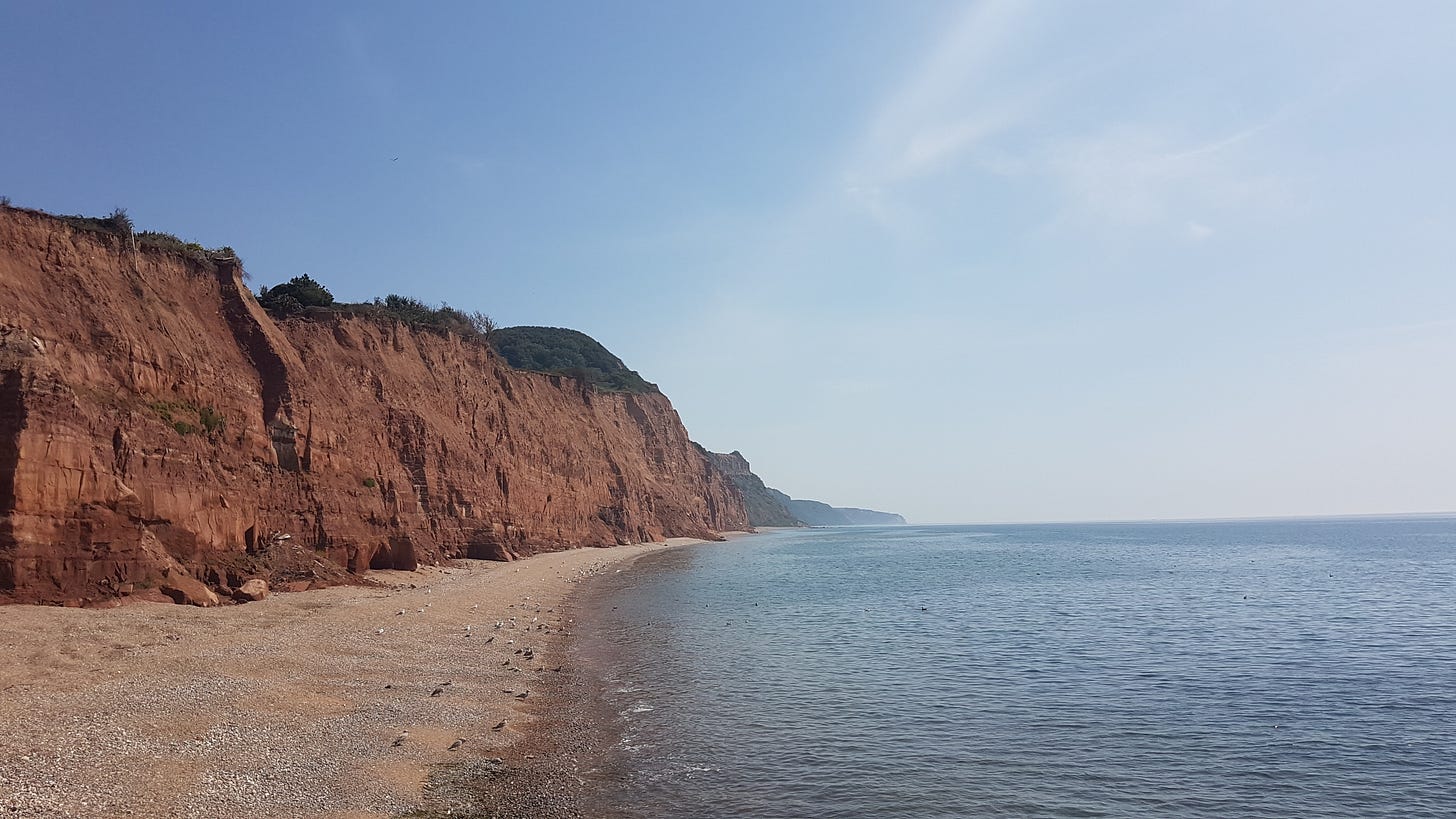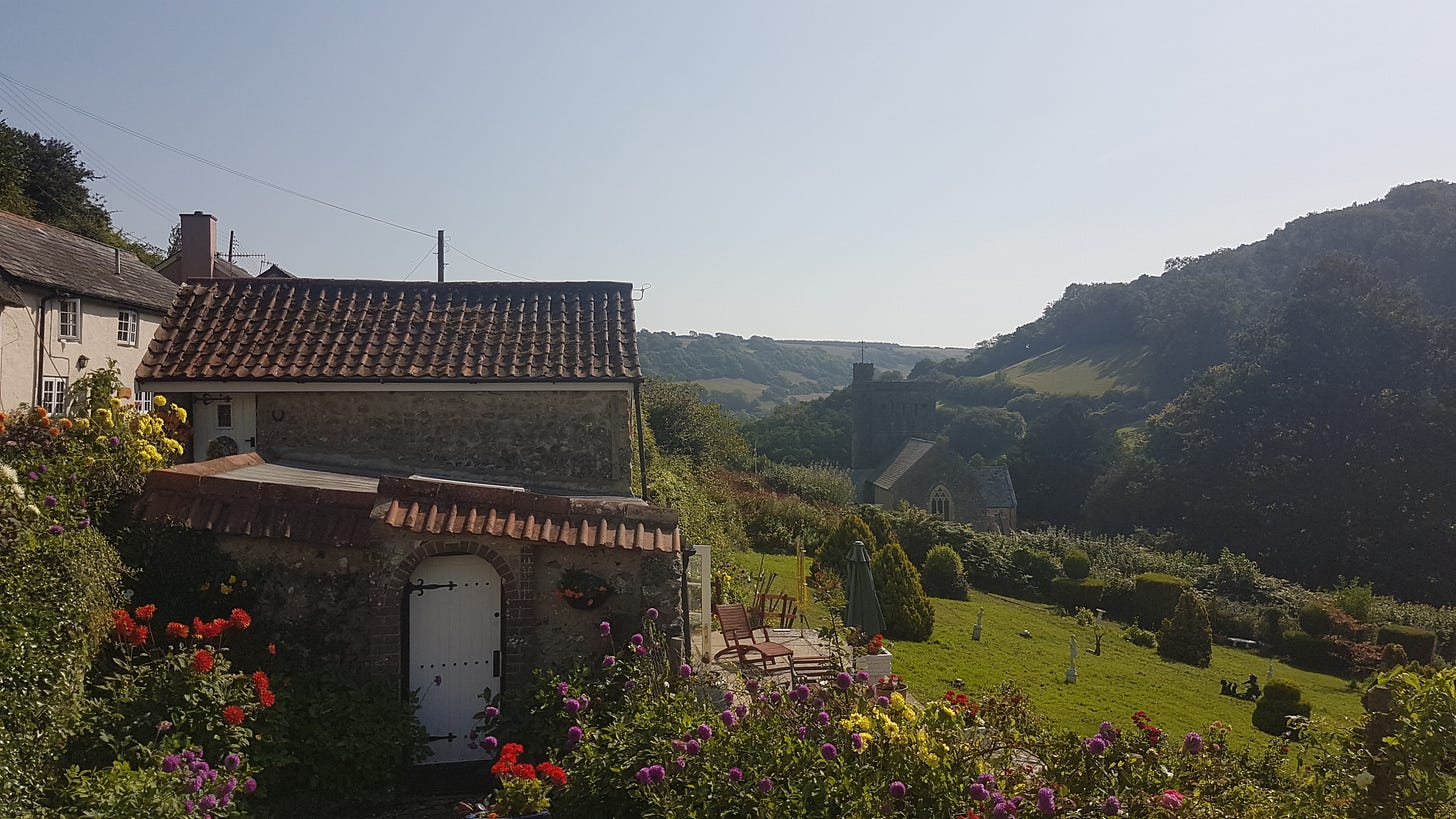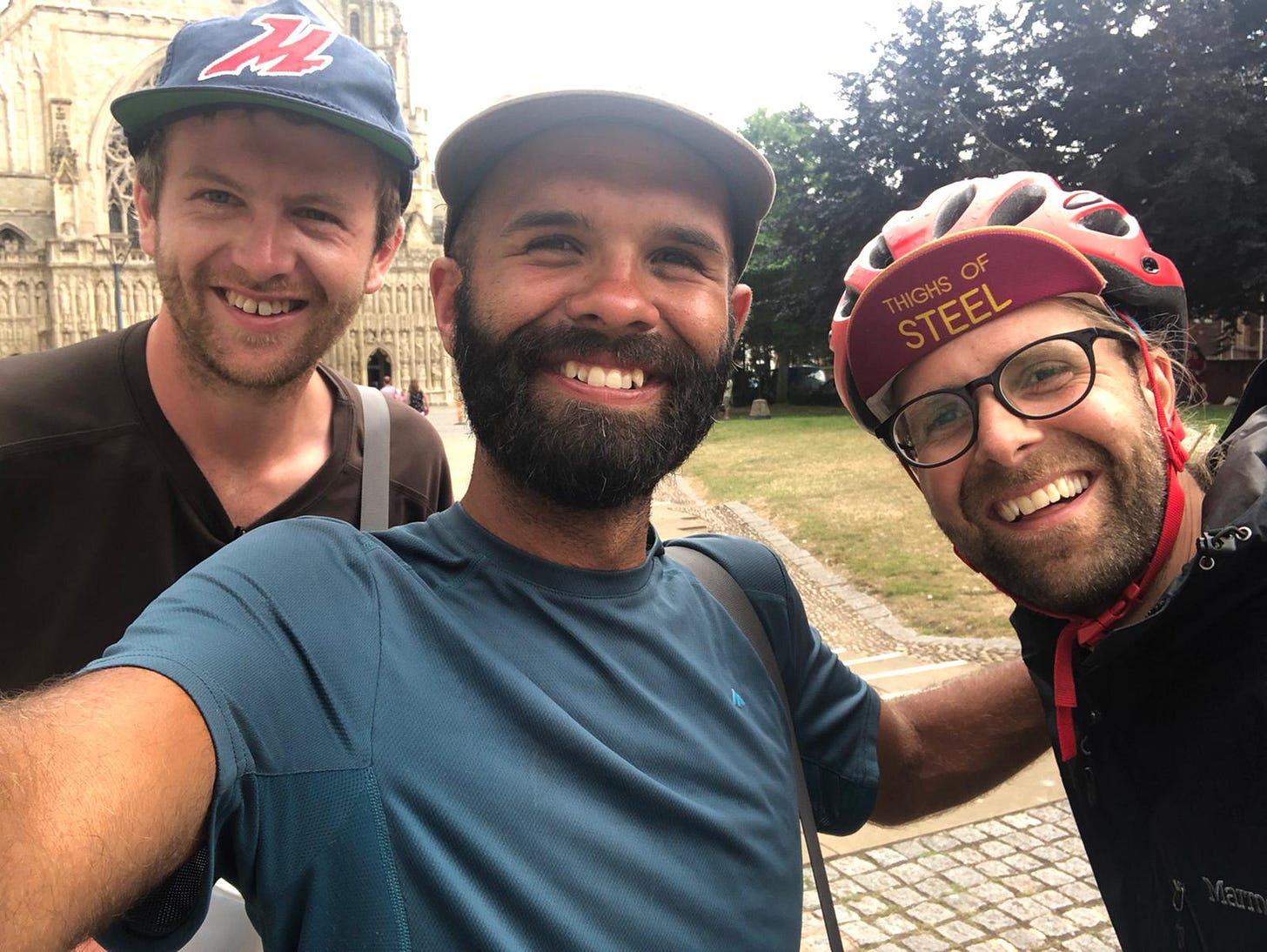Happy Friday!
Four days of shorts and sandals weather has reminded me that I’m outdoors.
All the time.
I’m even writing this from an outdoor table at a cafe-cum-antiques-shop on the quayside in Exeter. Gladly, I’m under an umbrella, after yesterday’s cautious ride brought home the origin of the cliche of ‘blistering’ heat.
I only covered 61km at a leisurely hill-inspired pace and refreshed the ride with no less than three dunkings in the English Channel, at Beer, Sidmouth and Budleigh Salterton. Still, I was outdoors all day and that was enough sunshine for the heat to be radiating off my skin all night and into the morning.
My thinking is a little scrambled and my mood subject to irritability: a sure sign that I should spend more time in the shade, doing nothing intelligent.
So welcome to the newsletter!
Leave no trace
Once I’ve recovered a faculty or two, I be cycling across Dartmoor to a wild camp spot at Foggintor Quarries, following the trail of two awesome tourers I met/accosted in Exeter.
Will and Daryl have cycled the opposite way to me, down from Liverpool, around Wales and through Devon and Cornwall. It was a real joy to share stories and compare insect bites while they drank coffee and I ate a spectacular kimchi and tofu sandwich from The Exploding Bakery Cafe.
The past three days of riding have exhausted not only my sweat glands, but also my supply of adjectives. East Devon is not a designated Area of Outstanding Beauty for the purposes of a practical joke.

Above: The Jurassic Coast at Sidmouth
In this case, both words and photography are inadequate to the task of inserting you into the scene, but hopefully they might cement you in your budding opinion that, yes, you will leave your house and step outside to feel the rivers, glades, and pastures that quietly surround you.

Above: Doreen’s Garden, Branscombe
In the absurdly pictogenic village of Branscombe, a strip of thatched cottages and rose petals that conspire before a cobblestone church, sits a garden that unrolls into the valley. From the top, you can see carefully tended beds and meditative benches and a sign that says: ‘Doreen’s Garden, open to visitors all year round’.
I didn’t meet Doreen, but I put a pound into the collection bucket for the Devon Air mbulance with a prayer that Doreen is merely the spade-head of a new movement to open up ‘private’ space to public enjoyment.
As someone ‘wild’ camping around England, a place where such guerilla accommodation is technically illegal without the permission of the landowner, the concept of public and private space is very important to me.
I’m reassured by the old folks I meet on the road, the salt-of-the-earth types who have lived round these parts for years. They say things like, ‘Don’t worry about the No Camping signs - they’re only there in case a whole hoard of people move in and won’t shift.’
Despite this reassurance, wouldn’t it be nice if the default legal position was that leave-no-trace, short term camping is permitted so long as it doesn’t disturb livestock, wildlife or agriculture. Why not?
And you don’t have to look far for that legal structure. The Scottish Outdoor Access Code protects the right to camp responsibly: in small numbers, for two or three nights in one place, avoiding enclosed fields of crops or farm animals as well as buildings, roads and historic monuments.
In England, Wales and Northern Ireland the law and the perceived attitude to wild camping are very different. But I’ve been open about my accommodation choices and have met no one who has opposed them or even expressed disapproval.
So perhaps the public perception of wild camping is ahead of the law in England, Wales and Northern Ireland. Perhaps that means we can change it. Perhaps it is already changing.
Maybe because of its long association with the military, the right to wild camp is protected on Dartmoor (very convenient because that’s the direction I’m heading).
In the Lake District National Park, the National Trust now ask that people avoid lowland areas and head to the higher fells - and of course to leave no trace.
The spirit of leave no trace is absolutely non-negotiable.
Leaving anything but an impression in the grass will have an adverse effect on the wildlife - and reduce the chances that wild camping, legal or illegal, will be tolerated in the future.

Above: Leaving no trace in an empty field in Dorset.
The pandemic has brought millions of people out into the countryside - a glorious rediscovery of the natural beauty and medicine of this island - but an unfortunate minority have conservation-shaped holes in their outdoors education.
Recently, the Guardian reported that a throwaway ‘festival’ culture has been brought into certain popular wild camping spots and the damage caused means that local rangers are having to clamp down on all overnighters.
Of course, clamping down is not the solution: the problem doesn’t seem to exist in Scotland, with its long history of outdoor access. Because it’s part of their birthright, Scottish campers also inherit an inkling of how to camp responsibly.
In England, it’s as if we’ve only just discovered an enormous lake of ice cream and we’ve jumped straight in, boots and all, without regard for spoiling the dessert that we share. Education, beginning with leave no trace, is the spoon that everyone should be given, long before their stomachs start rumbling.
We need a change in the law. And we need more spoons.
I told you I’d lost a faculty or two.
Bikes are horses too!
You can also read this piece at your leisure on my website:
Bike are horses too!
Every single day I’m on my bike there are moments when I think: ‘I could have been killed there.’
Cars passing at speed too closely is the most common one. Yet, every now and again, I come across a horse and rider enjoying the same country lanes as me and watch in awe as these same lethal cars slow right down, pull over to one side or stop until the horse has passed.
I wish that our nation’s car drivers understood that cyclists are as vulnerable (and as unpredictable) as horse riders. We sometimes swerve to avoid potholes that you can’t see; we sometimes are blown around by wind that you can’t feel. And our flesh tears as easily as any horse’s, I promise you.
While riding, I daydreamed of starting a cycle-protection campaign: Bikes are horses too!
Then I learnt that the government are currently consulting on a raft of changes to the Highway Code that would recognise the vulnerability of cyclists, pedestrians and horse riders to inadequate or inattentive drivers.
It can’t come soon enough.
So please, if you’d like to see fewer human or animal carcasses on your roads (or bodies taking up space in your hospitals), take five minutes to respond to the government consultation here: Changes to The Highway Code: improving safety for cyclists, pedestrians and horse riders.
Cycling UK has summarised the changes that will protect cyclists, but it’s worth adding that the proposed ‘hierarchy of responsibility’ will also establish in law the duty of all road users to protect pedestrians—and that means cyclists should ride considerately too.
Finally, if you see someone driving dangerously then please (when safe) make a note of the vehicle's registration, colour, make and model (a quick photograph works well) and report the incident to the police on their non-emergency number 101. It takes a few minutes and your phone call could save lives. The AA has more information on how to make a report.
I don’t know why drivers think they can get away with dangerous overtaking manoeuvres when their numberplate identifies them so conspicuously. It’s like a bankrobber politely presenting their passport to the teller before pulling out an uzi and screaming, ‘Open up the safe, a-hole!’
Silly white man
Boris Johnson said some silly things about migration earlier in the week and my writing partner Beth Granville addressed his, erm, ‘concerns’ with a passionately argued series of social media posts.
Of course, the politics, economics and sociology are more complicated than you can squeeze into four Instagram images, but she’s done an awful lot better than Johnson’s reductionist vitriol: ‘bad, stupid and criminal’.
Quite frankly, I’m bored of our politicians’ fearful flinch response to foreigners, but he only feels like he can say these awful things because he believes that he has our support.
Digest that for a moment. He’s not a rogue politician going off the deep end: he is our prime minister and, until we show him otherwise, he is on safe ground with these insults.
The fear flinch is only one way of responding and the number of shares that Beth’s post has garnered shows that there are plenty of people who prefer to choose love.
Let’s go with that one, shall we?
Philoxenia in action
Huge thanks this week to: David and Margaret, esteemed parents of The Tim Traveller, for a lovely cup of tea - only nine years delayed. David, a retired Anglican vicar, told me how Covid-inspired Zoom services are now spreading The Word to people who wouldn’t be seen dead in a church. In every crisis, an opportunity.
Thanks to Will and Daryl, the two tourers from Lincoln, who brightened my day with enthusiasm for life on the road. And then slagged off Exeter cathedral: ‘It's not fit to wash Lincoln's boots!’

Above: Three cycle cap models and, in the background, an okay cathedral.
Mighty, mighty thanks to Exeter Paul, a truly generous host who saved me from a thunderstorm and revealed the true meanings behind what I called ‘the racist elephant’.
Thanks also to the many other people who have shared fleeting wisdom and encouragement along the track. You enrich my days.
Finally, and above all, to the family Charles for a mid-cycling holiday in the heat.
Big love,
dc:
CREDITS
David Charles wrote this newsletter. He publishes another newsletter about reading called Books Make Books. David is co-writer of BBC Radio Wales sitcom Foiled, and writes for The Bike Project, Center for International Forestry Research and Thighs of Steel. Reply to this email, or delve into the archive on davidcharles.info. Thank you for reading!
Unlock the commons for £30
These free weekly newsletters are currently 5.9 percent funded. You can unlock the commons for everyone forever (or at least until the Internet falls asleep) by becoming a paying subscriber from as little as £30 per year—that’s only 58p per newsletter. 10 percent is given away to fight inequality and injustice. Thank you.



